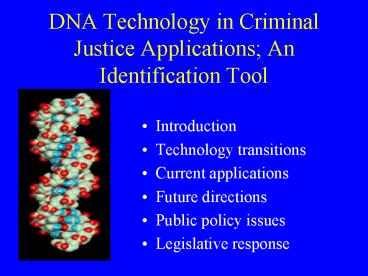DNA Technology in Criminal Justice Applications An Identification Tool - PowerPoint PPT Presentation
1 / 23
Title:
DNA Technology in Criminal Justice Applications An Identification Tool
Description:
Individually unique (except for identical twins) ... 'DNA Fingerprinting' Dr. Alec Jeffreys 1985 'DNA Profiling' FBI (RFLP) 1988 ... – PowerPoint PPT presentation
Number of Views:531
Avg rating:3.0/5.0
Title: DNA Technology in Criminal Justice Applications An Identification Tool
1
DNA Technology in Criminal Justice Applications
An Identification Tool
- Introduction
- Technology transitions
- Current applications
- Future directions
- Public policy issues
- Legislative response
2
(No Transcript)
3
Forensic Evidence May . . .
- Establish a legal element of the crime
- identify the perpetrator
- reconstruct the criminal event
- link the suspect to the victim or the scene
- exonorate innocent suspects
4
Why DNA?
- Individually unique (except for identical twins)
- Present in virtually all body tissues (bone,
hair, blood, saliva and other body fluids and
tissues) - Inheritance (Paternity, Maternity, Unidentified
Remains) - Crime incidents and scenes (exchange principle)
5
Not Guilty
Guilty
6
DNA is Only One Pieceof the Crime Solving Puzzle
Tox
Interviews
DNA
SAFIS
7
Technology Transition
- DNA Fingerprinting Dr. Alec Jeffreys 1985
- DNA Profiling FBI (RFLP) 1988
- PCR DQalpha Polymarker? 1990
- PCR STRs 1993
- Mitochondrial DNA - 1996
- Multi-plex STRs 1997
- Y-chromosome analysis
- SNPs
- Chips
8
Factors Driving the Changes
- Discrimination potential
- Sensitivity
- Reliability
- Ease of interpretation
- Speed of analysis
- Cost
9
Standards Development
- Technical Working Group (TWGDAM)
- Federal DNA Advisory Board (DAB)
- Quality assurance standards
- NDIS Standards
- Data compatibility
- FBI approved test methods
- FBI approved test kits
10
- Accessible only by authorized users for criminal
justice identification purposes - Controls on data permitted in system
- Strict controls on access and dissemination
- Periodic audits
11
Data Sharing Standards
- CODIS (Combined DNA Index System)
- Convicted Offender Index
- Forensic Index
- Missing Unidentified Persons
- Data compatibility (13 core loci STRs)
- Data integrity (quality assurance standards)
- Data transfer, retention and access controls
12
CODIS the National DNA Database
- Over 1 million DNA profiles of convicted
offenders - Over 36,000 forensic profiles
- Participation by 42 States
- Over 5000 investigations aided
13
Expanding the Index
- Offenders tend to be versatile rather than
specialized in offending patterns - Expanding the index offenses insures early
intervention - Future crimes by career criminals may be
prevented - Increase the certainty of detection
- Higher solution rate for crimes
14
(No Transcript)
15
(No Transcript)
16
(No Transcript)
17
Future Expansion of the DNA Database
- All felons?
- All crimes?
- Suspects?
- Arrestees?
- Juveniles YOs?
- All citizens?
18
(No Transcript)
19
Public Policy Issues
- Genetic privacy
- Who should shouldnt be in the DNA Database?
- Who should have access to the DNA Database?
- How can the information in the DNA Database be
used? - How long is a DNA sample retained?
20
Legislative Response
- DNA Identification Act of 1994
- State Legislation
- Federal funding for DNA Databanks
21
Current Federal Initiatives
- Funds to states to process offender backlogs
- Funds to states to process backlogged cases that
have no suspect - Authorization for states to use federal contract
labs to process offender specimens (lab must
comply with FBI standards) - DNA Sexual Assault Justice Act of 2002
(S. 2513)
22
Other Potential Applications as an Identification
Tool
- Civil paternity
- Hair eye color
- Pedigrees
- Taggants
- Printing inks
- Explosives
23
John Hicks Director
Office of Forensic Services
New York State Division of Criminal Justice
Services Albany, New York
(518) 457-1901
jhicks_at_dcjs.state.ny.us






























